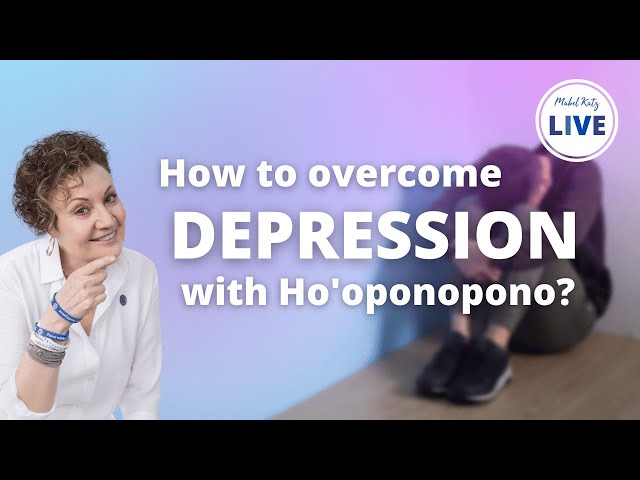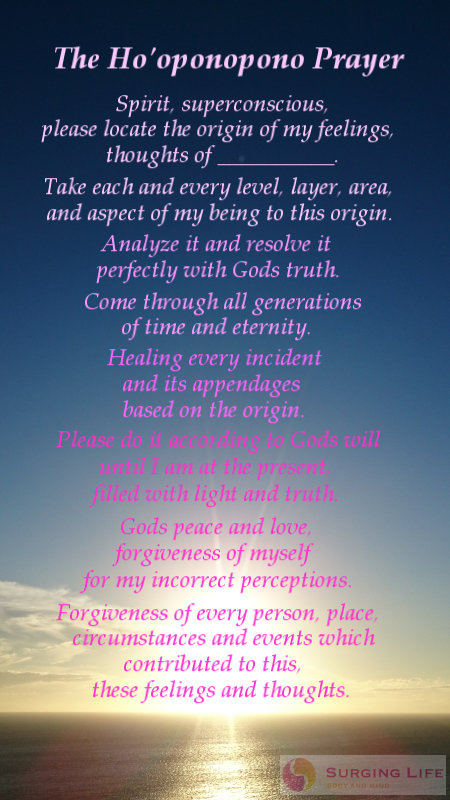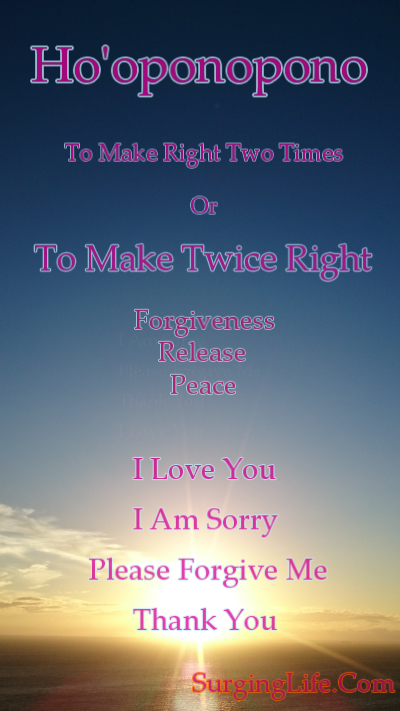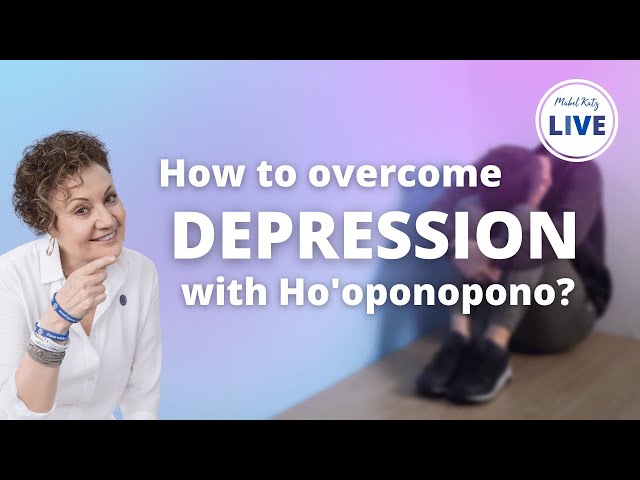Are you looking for an effective way to manage your depression? Look no further than Ho’oponopono, a powerful Hawaiian healing practice that has been used for centuries. By incorporating the principles of forgiveness, gratitude, and love, Ho’oponopono offers a unique approach to tackling depression and restoring inner peace. In this article, we will explore how Ho’oponopono can help you in managing your depression and provide you with the tools to start your healing journey. So, get ready to discover the transformative power of Ho’oponopono and take control of your mental well-being.

Understanding Depression
Definition of depression
Depression is a mental health condition characterized by persistent feelings of sadness, hopelessness, and a loss of interest in activities. It can affect various aspects of a person’s life, including their mood, thoughts, and physical well-being. Depression is more than just feeling down or having a bad day; it is a serious condition that requires attention and treatment.
Causes of depression
Depression can have various causes, and it is often a combination of genetic, environmental, and psychological factors. Some common causes of depression include:
-
Genetics: Research suggests that individuals with a family history of depression may be more susceptible to developing the condition themselves.
-
Brain chemistry: Imbalances in certain chemicals in the brain, such as serotonin and dopamine, can contribute to the development of depression.
-
Environmental factors: Traumatic events, loss of a loved one, chronic stress, or significant life changes can trigger or exacerbate symptoms of depression.
-
Personality factors: Certain personality traits, such as a negative thinking pattern, low self-esteem, or a tendency to ruminate on negative experiences, can make a person more vulnerable to depression.
-
Other medical conditions: Depression can be a symptom of other underlying medical conditions, such as thyroid disorders or chronic pain.
Effects of depression
Depression can have a profound impact on all areas of a person’s life. Some common effects of depression include:
-
Emotional symptoms: Persistent feelings of sadness, emptiness, or irritability, as well as a loss of interest in previously enjoyed activities.
-
Physical symptoms: Fatigue, changes in appetite and weight, sleep disturbances, and physical pain without a clear medical cause.
-
Cognitive symptoms: Difficulty concentrating, making decisions, or remembering things. Negative thoughts and a pessimistic outlook are also common.
-
Social and interpersonal difficulties: Depression can strain relationships, lead to social isolation, and affect a person’s ability to perform well at work or school.
-
Increased risk of other health problems: Untreated depression can increase the risk of developing other mental health disorders, such as anxiety, as well as physical health conditions like heart disease.
Introduction to Ho’oponopono
History and origins of Ho’oponopono
Ho’oponopono is a traditional Hawaiian practice of reconciliation and forgiveness. It has its roots in the ancient Hawaiian culture and was traditionally used to resolve conflicts within families or communities. The word “ho’oponopono” translates to “to make things right” and reflects the core principle of the practice – restoring harmony and balance.
Principles of Ho’oponopono
The principles of Ho’oponopono are grounded in the belief that we are responsible for our own experiences and that healing begins from within. It emphasizes the importance of taking ownership of our thoughts, emotions, and actions, and acknowledging our interconnectedness with others and the world around us. The practice is based on four key principles:
-
Responsibility: Accepting responsibility for our experiences and the role we play in creating them. Ho’oponopono encourages individuals to take ownership of their emotions, behaviors, and the impact they have on others.
-
Forgiveness: Cultivating forgiveness towards oneself and others is central to Ho’oponopono. It recognizes that holding onto grudges, resentment, or anger only perpetuates suffering and hinder personal growth.
-
Gratitude: Practicing gratitude is an essential aspect of Ho’oponopono. It involves expressing appreciation for the blessings in life, focusing on the positive aspects, and shifting one’s perspective towards a more optimistic outlook.
-
Love: Love is considered the most transformative force in Ho’oponopono. It encourages individuals to approach themselves and others with love and compassion, recognizing that true healing begins with self-love.
The practice of Ho’oponopono
Ho’oponopono is typically practiced through a combination of meditation, mantra repetition, and introspection. It involves acknowledging and releasing negative emotions, thoughts, and beliefs that hinder one’s well-being. The key steps involved in the practice of Ho’oponopono include:
-
Taking responsibility: Acknowledging one’s role in creating and perpetuating negative experiences or emotions.
-
Expressing forgiveness: Offering forgiveness to oneself and others for past actions or harms, recognizing that forgiveness is a powerful tool for healing.
-
Engaging in gratitude: Cultivating a mindset of gratitude by focusing on positive aspects, expressing appreciation, and counting blessings.
-
Repeating mantras: Using specific Ho’oponopono mantras, such as “I’m sorry, please forgive me, thank you, I love you,” as a means of releasing negative energy and promoting healing.
Ho’oponopono and Healing
Concept of healing in Ho’oponopono
In the context of Ho’oponopono, healing goes beyond the physical realm and encompasses the restoration of emotional, mental, and spiritual well-being. Ho’oponopono views illness and emotional distress as a result of disharmony and imbalances within oneself.
Through the practice of Ho’oponopono, individuals are encouraged to take an active role in their own healing journey. By taking responsibility for their thoughts, beliefs, and actions, they can create a positive shift in their well-being.
The role of forgiveness in healing
Forgiveness plays a central role in the healing process of Ho’oponopono. It allows individuals to release negative emotions, grudges, and resentments that may be contributing to their emotional pain and suffering.
By forgiving oneself and others, individuals can let go of the past, free themselves from the burden of anger and resentment, and create space for healing and growth. Forgiveness promotes inner peace, compassion, and a greater sense of emotional well-being.
The power of intention in Ho’oponopono
Intention is a significant aspect of Ho’oponopono, as it guides the healing process. Setting clear intentions for healing, self-love, and forgiveness helps individuals focus their energy and attention on their desired outcomes.
Intention acts as a powerful catalyst for change and transformation. By aligning their thoughts, emotions, and actions with their intentions, individuals can create positive shifts in their lives and promote healing on a deeper level.
The Connection between Ho’oponopono and Depression
Understanding the link between emotions and depression
Depression is closely intertwined with emotional well-being. Emotions, such as sadness, guilt, anger, or shame, can contribute to the development and persistence of depression.
Ho’oponopono recognizes the direct link between emotions and depression. By addressing and releasing negative emotions through the practice of Ho’oponopono, individuals can potentially alleviate symptoms of depression and promote emotional well-being.
Ho’oponopono as a tool for emotional healing
Ho’oponopono offers a unique and holistic approach to emotional healing. Its principles, which emphasize taking responsibility, forgiveness, gratitude, and love, provide a framework for individuals to work through emotional pain and trauma.
Through the practice of Ho’oponopono, individuals can identify and release deep-seated emotional patterns that may contribute to depression. By cultivating self-awareness and actively engaging in the healing process, Ho’oponopono empowers individuals to address their emotional well-being at its core.
Addressing underlying issues through Ho’oponopono
Depression often has underlying factors, such as unresolved trauma, negative beliefs about oneself, or unexpressed emotions. Ho’oponopono provides a safe space for individuals to address these underlying issues and work towards resolution and healing.
By taking responsibility for their emotions and experiences, individuals can explore and understand the root causes of their depression. Through forgiveness, self-love, and intentional healing practices, Ho’oponopono offers a pathway to addressing these underlying issues and finding lasting relief from depression.

Practical Techniques for Using Ho’oponopono in Managing Depression
Ho’oponopono mantra and meditation
Using Ho’oponopono mantras and engaging in meditation can be powerful tools for managing depression. Mantras, such as “I’m sorry, please forgive me, thank you, I love you,” can be repeated during meditation to release negative energy, promote self-forgiveness, and cultivate feelings of love and gratitude.
Meditation allows individuals to quiet the mind, focus their attention, and create a space for healing and introspection. By incorporating Ho’oponopono mantras into meditation practices, individuals can foster a sense of calm, inner peace, and emotional well-being.
Self-identity and self-love exercises
Ho’oponopono emphasizes the importance of self-love and self-acceptance in the healing process. Engaging in self-identity and self-love exercises can be beneficial for managing depression.
Practices such as positive affirmations, journaling, or mirror work can help individuals develop a more positive self-image, challenge negative beliefs, and cultivate a greater sense of self-worth. By actively working on self-love and self-acceptance, individuals can counteract negative thought patterns and promote emotional healing.
Cleaning and clearing techniques
Ho’oponopono encourages individuals to “clean” and “clear” negative emotions, memories, and beliefs that contribute to depression. Cleaning and clearing techniques involve actively acknowledging and releasing negative thoughts or emotions as they arise.
One such technique involves stating the Ho’oponopono mantra and mentally or verbally expressing gratitude and forgiveness while visualizing the negative energy dissipating. This practice allows individuals to actively address and process negative emotions, contributing to a sense of emotional release and well-being.
Benefits of Ho’oponopono in Managing Depression
Reducing feelings of guilt and shame
Depression often brings about feelings of guilt, shame, or self-blame. Ho’oponopono offers a path towards self-forgiveness and self-acceptance, reducing these negative emotions. By taking responsibility, forgiving oneself, and embracing self-love, individuals can alleviate the burden of guilt and shame associated with depression.
Promoting self-acceptance and self-forgiveness
Ho’oponopono promotes self-acceptance and self-forgiveness as essential components of healing. By releasing negative emotions, addressing underlying issues, and actively engaging in self-love practices, individuals can cultivate a sense of self-acceptance and compassion towards themselves. This, in turn, promotes emotional healing and a more positive outlook on life.
Providing a sense of peace and tranquility
The practice of Ho’oponopono offers a pathway to inner peace and tranquility. By embracing forgiveness, gratitude, love, and self-responsibility, individuals can release emotional burdens, find resolution, and experience a greater sense of peace. This sense of tranquility can contribute to managing depression and promoting overall well-being.

Scientific Evidence and Studies on Ho’oponopono for Depression
Research on the effectiveness of Ho’oponopono
While scientific research on Ho’oponopono’s specific effects on depression is limited, studies on related concepts, such as forgiveness and mindfulness, provide some insight. Research indicates that forgiveness practices, like those emphasized in Ho’oponopono, can lead to positive outcomes, such as improved mental health and reduced symptoms of depression.
Studies also suggest that mindfulness-based practices, which share similarities with Ho’oponopono’s principles of self-awareness and acceptance, can be effective in managing depression and enhancing overall well-being.
Case studies and testimonials
Although empirical studies on Ho’oponopono for depression are lacking, there are anecdotal accounts and testimonials that attest to its potential benefits. Personal stories from individuals who have tried Ho’oponopono often highlight improvements in emotional well-being, a reduction in depressive symptoms, and a greater sense of peace and self-empowerment.
While these accounts cannot be generalized, they offer valuable perspectives on the subjective experiences of individuals who have incorporated Ho’oponopono into their journey of managing depression.
The role of Ho’oponopono in traditional and alternative medicine
Ho’oponopono is increasingly being recognized and utilized within both traditional and alternative medicine practices. It is often seen as a complementary approach to conventional therapies and can be integrated into treatment plans for individuals with depression.
By addressing emotional and spiritual aspects of healing, Ho’oponopono can enrich traditional therapies, such as psychotherapy or medication, by promoting emotional release, self-awareness, and self-healing. Its holistic approach aligns with the growing recognition of the mind-body connection and the importance of addressing emotional well-being in managing depression.
Combining Ho’oponopono with Other Therapeutic Approaches
Using Ho’oponopono alongside conventional therapy
Ho’oponopono can be used alongside conventional therapy for managing depression. It is important to consult with healthcare professionals and ensure that Ho’oponopono complements the prescribed treatment plan.
By incorporating Ho’oponopono practices into therapy sessions, individuals can enhance their healing journey. The principles of taking responsibility, forgiveness, and self-love can be integrated into therapy interventions, promoting a holistic approach to managing depression.
Integrating mindfulness and meditation practices
Mindfulness and meditation practices share similarities with Ho’oponopono and can be seamlessly integrated. Mindfulness techniques, such as breath awareness and body scans, can help individuals cultivate self-awareness and observe their emotions and thoughts without judgment.
Meditation practices, using Ho’oponopono mantras or other affirmations, can be combined with mindfulness to promote emotional healing, relaxation, and a greater sense of peace. Integrating these practices can provide individuals with additional tools for managing depression and cultivating emotional well-being.
Complementary techniques for holistic wellbeing
In addition to combining Ho’oponopono with traditional therapy and mindfulness practices, individuals may consider incorporating other complementary techniques for holistic well-being. These may include physical exercise, healthy nutrition, creative expression, and other self-care activities that promote overall wellness.
By adopting a multi-faceted approach to managing depression, individuals can address the various aspects of their well-being. Ho’oponopono can serve as a foundational practice, providing principles and tools for emotional healing, while other techniques can contribute to a well-rounded and holistic approach to managing depression.

Personal Stories and Experiences with Ho’oponopono for Depression
Testimonies from individuals who have tried Ho’oponopono
Numerous personal testimonies shed light on the potential benefits of Ho’oponopono for managing depression. Individuals have reported significant improvements in their emotional well-being, reduced symptoms of depression, and a deeper sense of self-empowerment and peace.
These personal stories vary in their experiences, with some individuals finding relief from long-standing depressive symptoms, while others report milder improvements. While individual experiences may vary, these testimonies highlight the potential of Ho’oponopono as a self-healing tool for depression management.
Success stories of overcoming depression with Ho’oponopono
Success stories of individuals overcoming depression with the help of Ho’oponopono provide inspiring examples of the practice’s transformative potential. These stories often portray individuals who have experienced a significant reduction in depressive symptoms, improved overall well-being, and a renewed sense of hope and purpose.
While these success stories illustrate the positive outcomes that Ho’oponopono can bring, it is important to note that it may not be a standalone solution for everyone. Combining Ho’oponopono with other therapeutic approaches, as well as seeking the guidance of healthcare professionals, can enhance the likelihood of successful outcomes.
Practical tips for integrating Ho’oponopono into daily life
Integrating Ho’oponopono into daily life can be a transformative practice for managing depression. Some practical tips for doing so include:
-
Setting intentions: Start each day by setting intentions for self-healing, forgiveness, and emotional well-being. This can help focus your energy and mindset on bringing positive change into your life.
-
Regular practice: Dedicate time each day for meditation, mantra repetition, or other Ho’oponopono techniques. Consistent practice allows for greater integration and benefits over time.
-
Self-reflection: Take moments throughout the day to reflect on your emotions, thoughts, and actions. This self-reflection can help identify any negative patterns or underlying issues that may contribute to depression.
-
Gratitude practice: Cultivate a mindset of gratitude by expressing appreciation for things large or small. Keeping a gratitude journal or practicing gratitude meditation can help shift your focus towards the positive aspects of life.
-
Seek support: Reach out to supportive individuals, such as friends, family, or therapists, who can provide guidance and encouragement on your healing journey. Support networks can be instrumental in managing depression and navigating the challenges that arise.
Final Thoughts and Conclusion
Embracing a holistic approach to managing depression is key to promoting overall well-being. Ho’oponopono offers a unique pathway to healing, with its emphasis on responsibility, forgiveness, love, and gratitude. By actively engaging in the practice of Ho’oponopono, individuals can address emotional well-being, release negative emotions, and cultivate a sense of self-empowerment and inner peace.
Although scientific research specifically on Ho’oponopono for depression is limited, its underlying principles align with established concepts such as forgiveness and mindfulness. Personal testimonies and success stories also highlight its potential benefits in managing depression.
By incorporating Ho’oponopono alongside conventional therapy, mindfulness practices, and other complementary techniques, individuals can create a comprehensive approach to managing depression and promoting emotional well-being. It is important to remember that depression is a complex condition, and seeking the guidance of healthcare professionals is integral to finding an individually tailored treatment plan.
In conclusion, Ho’oponopono offers a unique and empowering path for individuals seeking to manage depression and find lasting emotional healing. By embracing its principles and practices, individuals can take active responsibility for their emotional well-being, foster forgiveness and self-love, and create a profound shift in their lives.

